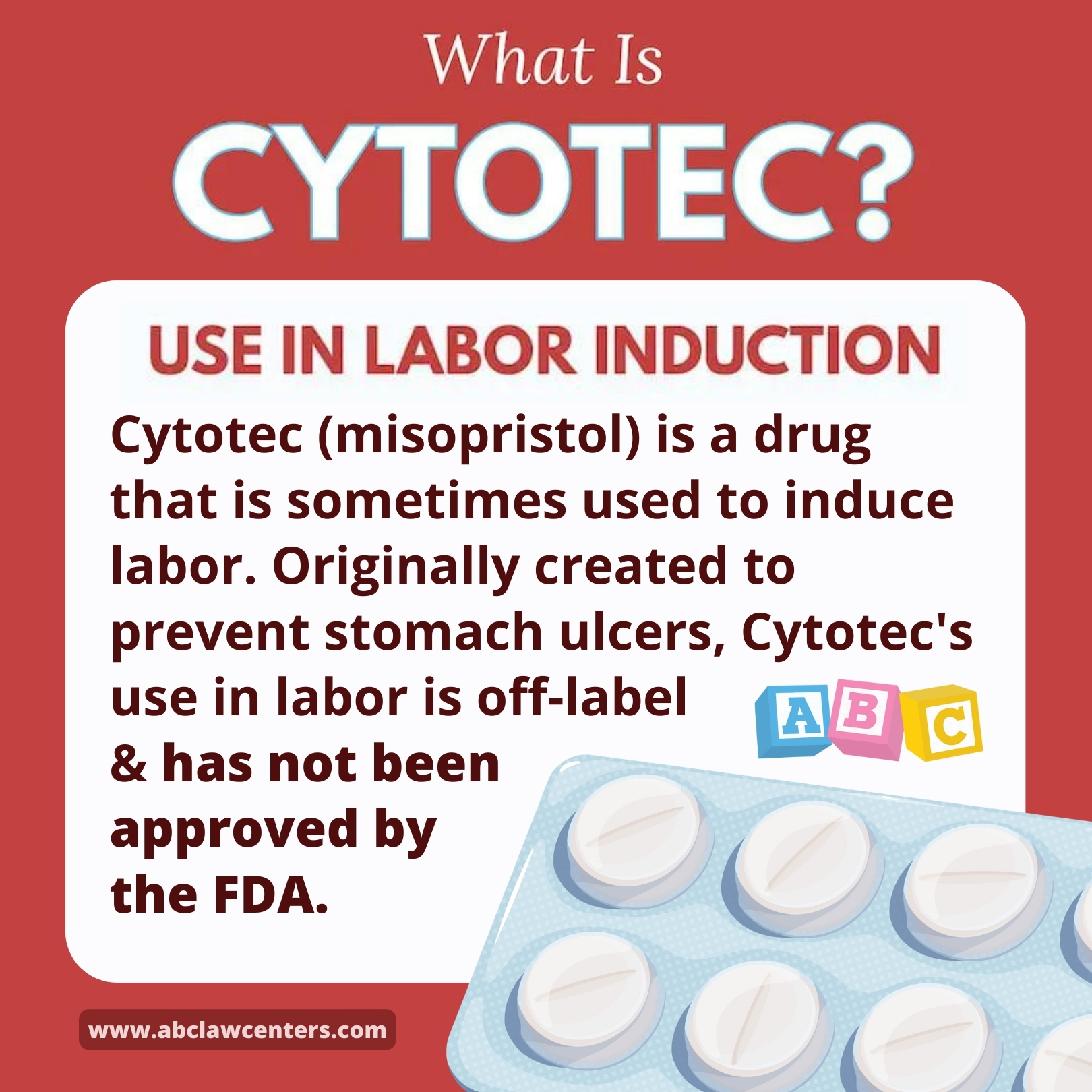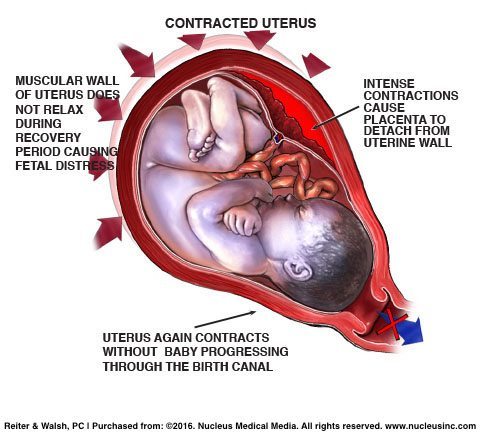Cytotec (Misoprostol) and Labor Injuries
Cytotec (misoprostol) is a drug that’s sometimes used to induce labor. Originally designed to prevent stomach ulcers, Cytotec’s use in labor induction is off-label and has not been approved by the FDA. There is no way to accurately predict how a mother and baby will respond to Cytotec, making its use in labor induction risky. Because Cytotec is administered by pill vaginally, it is not possible to rapidly discontinue its effects in the event the patient has an adverse reaction.
Were you given Cytotec to induce labor?
If you or your baby were injured from an induced labor, you have legal options.
What is Cytotec?

Cytotec is the brand name for the drug misoprostol, a synthetic form of the hormone prostaglandin. It has been researched, developed, and approved for preventing stomach ulcers. Cytotec is also frequently used to induce labor – even though the FDA has not approved its use for this purpose.
Why is Cytotec used to induce labor?
Cytotec can ripen the cervix – meaning it can help soften or dilate it to prompt vaginal labor. It can also start contractions. In certain situations, the baby may need to be delivered sooner than anticipated, or the patient may need assistance with starting labor. In developed countries, about one in four pregnant patients have their labor induced. Doctors may use drugs like Pitocin or Cytotec as one method to accomplish this.
Despite the fact that the FDA and the manufacturers of Cytotec have both issued warnings against off-label use of this drug, many doctors still prescribe Cytotec to induce labor. Unfortunately, its risks and misuse can result in permanent harm to both the mother and baby.
Risks of using Cytotec to induce labor
There are serious risks associated with using Cytotec to induce labor. Cytotec is administered by vaginal pill, rather than through IV or a removable vaginal insert like other labor drugs (e.g. Cervidil). The Cytotec pill may be cut into quarters to give a smaller dosage at one time. However, small doses of Cytotec can still be very dangerous. Since it’s immediately absorbed into the body, its use cannot be rapidly discontinued if the mother or baby has an adverse reaction.
Complications from Cytotec
Since it’s not possible to accurately predict how each mother and baby will react to Cytotec, it may be dangerous to prescribe for labor. Some of the adverse side effects of Cytotec to induce labor may include:
- Uterine hyperstimulation/tachysystole
- Impairment of blood flow to the baby because it can cause too many contractions which are too strong and last too long.
- Maternal hemorrhaging
- Uterine rupture
- Amniotic fluid embolism
- Pelvic pain
- Retained placenta
- Fetal bradycardia (slow heart rate)
- Meconium aspiration
- Death of the mother or baby
- Placental abruption (especially when used in women with preeclampsia)
Cytotec can also increase the need for an emergency c-section or an assistive device delivery due to the complications frequently associated with the drug. Some of these complications may necessitate a complete hysterectomy (removal of the uterus).
Use of Cytotec as a labor induction agent is especially risky for women who are of advanced gestational age (commonly defined as over 35), who have previously had uterine surgery (including a C-section), or who have previously given birth several times. Regardless, Cytotec is not FDA-approved for labor induction under any circumstances.

Risks of uterine hyperstimulation/tachysystole to a fetus in the womb
Can you refuse to take Cytotec?
Due to the risks and off-label use of Cytotec, it’s important that patients can give their informed consent to its use in their labor. Labor and delivery can be an incredibly stressful or painful time for pregnant patients, and medical staff must be attentive and communicate what is happening during labor and delivery. Patients have the right to know what procedures are being done and what drugs are being administered to them.
The American College of Gynecologists and Obstetricians (ACOG) states that there must be conditions for informed consent. “[Consent] involves the ability to choose among options and select a course other than what may be recommended. Pregnancy is not an exception to the principle that a decisionally capable patient has the right to refuse treatment, even treatment needed to maintain life.”
Patients can refuse Cytotec and request information to understand their options before making a decision with their medical provider.
Cytotec and birth injuries
Due to the risks and complications associated with Cytotec use for labor induction, there is also a chance that the baby will suffer a permanent injury. If medical staff misuse Cytotec, mismanage the labor and delivery, and/or ignore signs that the baby is in distress, that is considered medical malpractice. If your baby was injured from a Cytotec-induced delivery, you are entitled to legal compensation.
Birth injuries resulting from the use of Cytotec as a labor-induction agent can include:
- Hypoxic-ischemic encephalopathy (HIE), otherwise known as birth asphyxia
- Cerebral palsy (CP)
- Intellectual and developmental disabilities (I/DDs)
- Seizure disorders
- Periventricular leukomalacia (PVL)
It can be incredibly upsetting to learn that the providers that you trusted with your care made an error that hurt your baby. It is especially frustrating if your medical team did not communicate the risks of a drug like Cytotec to you. However, you are entitled to know what your legal rights are to obtain justice on behalf of your child.


Get Legal Help
Cytotec misuse can cause serious and permanent injuries such as cerebral palsy and HIE. Children with these conditions often go on to require expensive lifelong care. If your baby was harmed as a result of Cytotec misuse, call us to learn more about your legal options, at no charge or obligation to you
The birth injury attorneys and on-staff nurses at ABC Law Centers: Birth Injury Lawyers (Reiter & Walsh, P.C.) focus only on birth injury cases. For over 25 years, our team has worked with brave parents like you to get justice and compensation for your child’s life-long care. Reach out today for a free case evaluation. In fact, you pay nothing throughout the legal process unless we win your case.
Featured Videos
Posterior Position
Hypoxic-Ischemic Encephalopathy (HIE)

Featured Testimonial
What Our
Clients Say…
After the traumatic birth of my son, I was left confused, afraid, and seeking answers. We needed someone we could trust and depend on. ABC Law Centers: Birth Injury Lawyers was just that.
- Michael
Helpful resources
- Misoprostol for Cervical Ripening and Induction of Labour: A Review of Clinical Effectiveness, Cost-Effectiveness and Guidelines – NCBI Bookshelf
- Recent advances in the induction of labor – PMC
- Misoprostol (marketed as Cytotec) Information | FDA
- Abruptio placentae associated with misoprostol use in women with preeclampsia – The Journal of reproductive medicine
- Refusal of Medically Recommended Treatment During Pregnancy | ACOG


